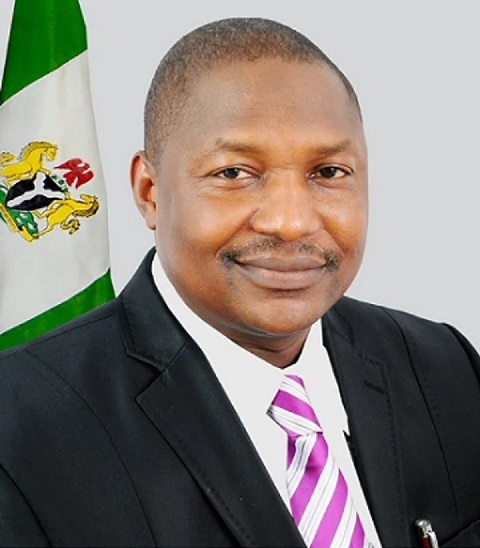COVER
Subsidy Removal Delayed to Allow Tinubu, APC Win Election –Buhari

By Mathew Dadiya, Abuja
Former President Muhammadu Buhari has broken his silence on the petrol subsidy removal ‘challenge’ that he left for his successor, Bola Tinubu, declaring that had the policy been implemented, the All Progressives Congress (APC) and Tinubu would have lost the last general polls.
Offering the explanation through his erstwhile spokesman, Garba Shehu, via a statement on Monday, the ex-president however, commended the steps taken so far by the new administration in implementing the removal of petrol subsidy and attempt to unify the Naira exchange rate.
The statement, according to Shehu, was in response to persistent queries by some critics who have questioned why it took Tinubu only weeks to remove the petrol subsidy whereas Buhari didn’t do so for several years.
According to him, successive polls indicated that the ruling party would have lost the 2023 election if the Petroleum Industry Act, containing the petrol subsidy removal, was implemented before then.
In the statement titled BUHARI DIDN’T FAIL TO REMOVE SUBSIDY, Shehu wrote: “Why did it take the new Tinubu/ Shettima presidency weeks to remove the petrol subsidy when Buhari didn’t do so for years fails to ask the right question.
“The massive electricity subsidy. The fraudulent fertilizer subsidy. Hajj/Christian Pilgrim subsidies. Remember them?
“The diesel subsidy. The aviation fuel subsidy. LPFO. Kerosene. Cooking gas and the other subsidy policies we found in place, and put them firmly on the ground. Remember them?
“For those with short memories, many of those subsides were all in place when president Buhari was elected to office in 2015: all those in place were gone by May 2023 – including the annual fertilizer subsidy that weighed 60-100 billion Naira (that’s trillion naira in about 10 years – yes you read that right) heavy on the federal budget each year.
“So no, Buhari didn’t remove the petrol subsidy – but in vitally important stages he removed every other budget-busting, egregious, economic-growth-crushing subsidy along the way.
“So far I have refrained from answering these repeated questions on the removal in Nigeria of subsidies on Premium Motor Spirit, PMS and that arising from the dual rates of the Naira in the Central Bank and the parallel market: Why did Buhari ‘fail’ to do these?
“First of all, my thinking is that instead of the former President answering this question, it is the Party, the All Progressives Congress, APC that is best suited to speak and failing to do this, we are forced to say what will follow here.
“Secondly, we are mindful of the fact that with a Tinubu/Shettima presidency now in place and for which there is a ‘New Sheriff in Town’.
“We do not want to distract them from the onerous tasks facing them and the nation. Neither is it our wish to take the spotlight away from them in any way.
“In terms of the timings of the decisions to remove fuel subsidy and unify the currency, the Tinubu/Shettima administration has done overwhelmingly well. Even more importantly, they have been most dexterous in managing the aftermath of the decisions by successfully avoiding any crisis.
“To this extent, our wish and prayers are that fellow countrymen will continue to support the new leadership in these very laudable decisions and, in particular, for the Labour leadership and civil society to work with them to ensure that the palliative efforts as promised are successfully implemented.
“The decision to remove subsidies, as in our case – and we believe in all situations – was not for the President to take all by himself.
“That’s why it’s important to remind ourselves – and all those who have conveniently forgotten – that Buhari administration had been on this pathway from the very beginning in 2015.
“Removing subsidies for the Naira and PMS was cued and put on hold. Look for example in the Petroleum Industry Act. The important decision was kept for a better time.
“It could not have come at a time when tensions were high in the country and no responsible leader would have added fuel to the fire.
“In the view of many-including those in the security circles- only a new administration with a goodwill that fills a warehouse can attempt this, and here now comes in the wit and grit of the Tinubu government.
“Finally, we must be politically honest with ourselves. TheBuhari administration in its last days could not have gone the whole way because the APC had an election to win. And that would have been the case with any political party that was seeking election for another term with a new principal at its head.
“Poll after polls showed that the party would have been thrown out of office if the decision as envisaged by the new Petroleum Industry Act was made.
“With the election now behind us, a capable leader as we now have in place is best positioned to move forward. We have nothing but confidence that the new administration will carry the nation and all its constituents into a stable future in the aftermath of these major economic and financial decisions.
“As they say, there are times when you have to lose in order to win.”
COVER
DAILY ASSET Appoints Torough, Editor, Names Eze, Deputy

By Laide Akinboade, Abuja
As part of efforts to reposition the newspaper for optimum corporate performance, the management of Asset Newspapers Limited, Publishers of DAILY ASSET, has announced the appointment of David Torough as the Editor of the Abuja-based national daily.
A statement by the management said the appointments were part of the company’s new strategy to further penetrate the various states in the country and raise its readership and patronage.
“DAILY ASSET is widely acceptable across the country and to maintain our leadership position, we need to increase management presence, hence the need to create new Bureau offices in some locations outside Abuja and Lagos,” the statement quoted the Publisher/ Editor-in-Chief, Dr Cletus Akwaya to have said.
In a statement yesterday, Publisher and Editor-in-Chief of the fast-growing daily, Dr. Cletus Akwaya said the appointment was part of the new strategy to properly situate the paper for better productivity.
“DAILY ASSET has a commitment with the Nigerian people. We are determined to weather the storm and give Nigerian readers a Newspaper that satisfies their yearnings and reading pleasure and we can only do that with the right set of professionals,” the statement said.
Akwaya, a former Commissioner of Information from Benue State said the difficult times being faced by Nigerians posed a great challenge to the media as the people deserved credible information with which to make choices.
“We have a bond with the people, to offer credible information at all times in the best tradition of the Nigerian Press and on this scale of objectivity, truth and fairness, we pledge to remain steadfast no matter the challenges,” Akwaya was quoted to have said.
He said the newspaper will maiantin its daily print run and circulation to all states of the federation and urged advertisers to take advantage of the deep penetration of the Daily Asset brand to send their messages.
Torough, the new Editor has had a steady rise in the Newspaper in the last five years.
A graduate of Mass communication of the Benue State University, Makurdi, Torough joined the company in 2022 as Benue State Correspondent. He was spotted for his brilliance and redeployed to Abuja the following year and promoted to Deputy News Editor. He was subswuently named Deputy Editor of the paper, a position he held until the recent appointment.
Torough has attended several journalistic workshops and trainings to properly equip himself for the task ahead.
The statement also said the Management named Eze Okechukwu as Deputy Editor.
Before his elevation as Deputy Editor, Eze has been Deputy Politics Editor and DAILY ASSET Newspaper correspondent covering the Senate, having joined the organization in 2021.
Born on March 10, 1975, Eze holds a Masters Degree in Mass Communication from the Enugu State University of Science and Technology.
Eze began his journalism career with Daily Star, Enugu and later worked with Daily Trust Newspaper, Abuja as sports reporter.
Aside from his journalistic excellence, he has a great deal of passion for sports.
COVER
Insecurity: Northern Govs, Monarchs Seek Six-month Mining Suspension

From Ngutor Dekera, Kaduna and Aliyu Askira, Kano
Northern governors and traditional rulers yesterday called for the suspension of mining activities across the region for six months, blaming illegal mining for worsening insecurity in many states.The resolution was contained in a communiqué issued after a joint meeting of the Northern States Governors’ Forum and the Northern Traditional Rulers’ Council held at the Sir Kashim Ibrahim House, Kaduna.
The meeting, chaired by the Gombe State Governor and NSGF Chairman, Muhammadu Yahaya, had in attendance the 19 northern governors and chairmen of the 19 states’ traditional councils. The Forum expressed concern over the escalating violence in parts of the North, including the killings and abductions recently recorded in Kebbi, Kwara, Kogi, Niger, Sokoto, Jigawa and Kano states, as well as renewed Boko Haram attacks in Borno and Yobe.“The Forum extends its deepest condolences and solidarity to the governments and good people of the affected states,” the communiqué said, noting that the attacks on schoolchildren and other citizens had become “unacceptable tragedies” that required urgent collective action.It commended President Bola Tinubu for what it described as the Federal Government’s “firm response” to recent abductions and insurgency threats, especially the rescue of some abducted pupils.The governors also saluted security agencies for their sacrifices on the frontlines.“We resolved to renew our support for every step taken by the President and Commander-in-Chief to take the fight to insurgents’ enclaves in order to end the criminality,” the Forum stated.A major highlight of the meeting was the North’s renewed push for the establishment of state police, with governors and traditional rulers insisting that decentralised policing had become inevitable.“The Forum reaffirms its wholehearted support and commitment to the establishment of state police,” the communiqué added, urging federal and state lawmakers from the region to “expedite action for its actualisation.”On illegal mining, the governors said criminal mining networks were fuelling violence and providing resources for armed groups.As a corrective measure, they asked Tinubu to direct the Minister of Solid Minerals to impose a six-month suspension of mining activities in order to allow for a full audit and revalidation of licences.“The Forum observed that illegal mining has become a major contributory factor to the security crises in Northern Nigeria. “We strongly recommend a suspension of mining exploration for six months to allow proper audit and to arrest the menace of artisanal illegal mining,” it said.To strengthen the fight against insecurity, the governors also announced the creation of a regional Security Trust Fund.Under the proposed arrangement, each state and its local governments will contribute ₦1bn monthly, to be deducted at source under an agreed framework.They said the fund would help provide sustainable financing for joint operations, intelligence-driven interventions and coordinated security responses across the region.At the end of the meeting, the Forum reaffirmed its commitment to unity and collective responsibility.“Only through unity, peer review and cooperation can we overcome the pressing challenges before us,” it declared.The Forum agreed to reconvene on a date to be announced.Meanwhile, Nigeria’s worsening security crisis took a grim turn on Monday as bandits launched fresh attacks in Kano State, abducting 25 villagers, even as the Federal Government raced to secure the release of more than 300 Catholic school children kidnapped in Niger State.In the early hours of Monday, armed bandits invaded Unguwar Tsamiya—popularly called Dabawa—in Shanono Local Government Area of Kano State, whisking away nine men and two women after shooting into the air and assaulting residents. The attackers also rustled two cows.A resident lamented the community’s helplessness: “We cannot do otherwise; most of us cannot leave because we have nowhere to go. This is our place, our land and everything is here.”The assault came less than 24 hours after a similar attack on Yan Kamaye in Tsanyawa LGA, a community along the volatile Katsina border.In Niger State, National Security Adviser Nuhu Ribadu has assured distraught families of St. Mary’s Co-Education School, Kontagora that the more than 300 students and staff abducted on November 21 will return home “soon.” Ribadu, who led a high-level federal delegation to the school on Monday, said the abductees are safe, though he offered no specifics on their location or the status of rescue operations.According to Daniel Atori, spokesman for the Catholic bishop overseeing the school, the NSA reassured officials: “The children are where they are and will come back safely.”The St. Mary’s attack is part of a worrying resurgence of mass kidnappings reminiscent of the 2014 Chibok schoolgirls’ abduction. Security analysts warn that banditry has evolved into a “structured, profit-seeking industry,” with hundreds of Nigerians abducted in November alone.The Kontagora school abduction occurred the same week 25 girls were kidnapped in Kebbi State—victims who authorities say have since been rescued through “non-kinetic” means. About 50 of the St. Mary’s hostages have also managed to escape.Ribadu’s delegation, which included the Minister of Humanitarian Affairs and the Director-General of the Department of State Services (DSS), reaffirmed the government’s commitment to securing the freedom of all abducted citizens.As communities from Kano to Niger continue to bear the brunt of these violent incursions, the escalating spate of kidnappings underscores the urgent national demand for a more decisive and coordinated security response.COVER
Abacha Loot Probe: Malami Faces EFCC Panel Daily in December

By David Torough, Abuja
The Economic and Financial Crimes Commission (EFCC) said former Attorney‑General of the Federation and Minister of Justice, Abubakar Malami, will face a team of interrogators at its office daily throughout December.A credible source in the EFCC said on Monday that the daily appearance was part of an ongoing investigation into the whereabouts of an alleged 490 million dollars Abacha loot secured through a Mutual Legal Assistance (MLAT) request.
The source said that Malami, who was summoned for interrogation by the EFCC on Saturday, was barred from leaving Nigeria for the next one month.According to the source, one of the conditions for his release on Saturday was that he should report daily to the EFCC Headquarters in Abuja for further interrogation.The source said Malami would have to appear daily at the anti-graft office due to the volume of the investigation and the seriousness of the charges against him.”We seized his passport, it is the normal routine during investigation, but he has to report at the EFCC headquarters in Abuja every day for the next month.”He will be reporting for further investigation throughout December.”He will be reporting every day, starting from Dec. 1st to Dec. 31st.He will appear before the team of investigators for the entire month of December.”He will be reporting to EFCC for investigation for the period because of the volume of the investigation and the seriousness of the charges against him,” the source added.According to the source, a fact sheet on the former minister revealed that Malami had several issues to clarify with the EFCC within the coming weeks.“We have asked him to explain the whereabouts of the $490 million Abacha loot secured through MLAT.“We didn’t say he stole money, but he should account for the loot. This is one of the issues he will clarify to our investigators.”The commission cited the large volume of documents he must review and the need for extensive interviews as reasons for seizing his passport.The source said EFCC would not engage in a war of words but would release its findings after a thorough investigation.Malami, in a statement by his media aide, Mohammed Doka, on Monday in Abuja, however, described the EFCC investigation as a political witch‑hunt.He confirmed he honored an EFCC invitation on Nov. 28, describing the engagement as fruitful and expressing confidence that the probe would vindicate him.Malami described the EFCC’s allegations as baseless, illogical and devoid of substance, insisting they collapse under factual scrutiny.




























